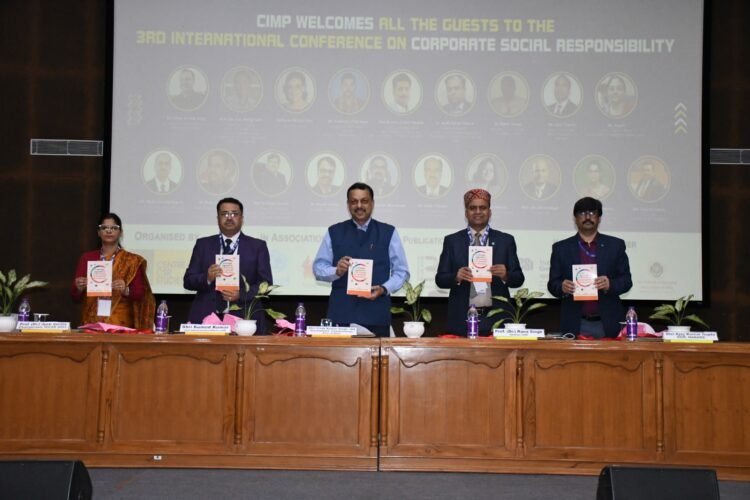PATNA (India CSR): In a landmark move, Bihar’s administration, under the vigilant guidance of Development Commissioner Vivek Kumar Singh, has announced the establishment of a specialized cell on Corporate Social Responsibility (CSR). This initiative is designed to ensure the meticulous enforcement and application of Corporate Social Responsibility (CSR) norms across diverse sectors in the state. The revelation of this pioneering strategy occurred at a significant event, underscoring the state’s commitment to social welfare and sustainable development.
It is worth menting that the CSR in India refers to initiatives taken by corporations to assess and take responsibility for the company’s effects on environmental and social wellbeing. The concept emphasizes sustainable development and inclusive growth by ensuring that businesses contribute to societal goals. The Companies Act 2013 in India mandates that companies with certain turnover and profitability criteria must spend a minimum percentage of their profits on CSR activities.
The role of State Governments in CSR in India includes creating a supportive environment for CSR initiatives, ensuring compliance with legal requirements, and facilitating partnerships between corporations and local communities. State Governments also play a crucial role in identifying priority areas for CSR activities, such as education, health, environment, and rural development, ensuring that the CSR contributions are aligned with the broader development goals of the region.
The Genesis of the Initiative
Inaugural Insights
During the inauguration of a two-day international conference on CSR (ICCSR), hosted by the esteemed Chandragupt Institute of Management Patna (CIMP), Commissioner Vivek Kumar Singh provided insights into the government’s vision. He emphasized the state’s dedication to implementing the CSR Act of 2013 effectively. This involves encouraging various enterprises to allocate a portion of their profits to social welfare ventures, as stipulated by the Act. The government’s strategy includes partnering with CIMP for the successful launch and operation of the CSR monitoring cell.
Collaborative Approach
Uniting for a Cause
The director of CIMP, Prof. (Dr.) Rana Singh, highlighted the conference’s core purpose: to serve as a platform for exchanging insights among academicians, researchers, managers, policymakers, NGOs, and industry experts. The primary focus is on various facets of CSR, particularly prioritizing health welfare and sustainable development. This collective approach marks a significant step towards integrating CSR more deeply into the fabric of corporate culture and social governance.

Expanding the Horizon
Beyond Compliance: Towards Holistic Development
This innovative move by the Bihar government transcends mere regulatory enforcement. It embodies a holistic approach towards societal development, integrating the corporate world’s potential into the broader social fabric. By monitoring and guiding CSR activities, the cell aims to ensure that corporate contributions effectively address key areas such as health, education, and environmental sustainability. This strategy aligns with global sustainable development goals, positioning Bihar as a state that not only enforces laws but also nurtures a socially conscious business ecosystem.

The Role of Academia
Bridging Theory and Practice
The collaboration with Chandragupt Institute of Management Patna (CIMP) is a testament to the vital role academia plays in shaping policy and practice. By involving an educational institution in the monitoring process, the government ensures that the latest research and theoretical frameworks inform CSR activities. This partnership paves the way for evidence-based strategies and innovative solutions in addressing social challenges, making CSR more than a mandate – a mission driven by knowledge and expertise.
Industry Response
Corporate Sector Embracing Responsibility
The reaction from the corporate sector to this initiative is a critical component of its success. By aligning their goals with the state’s vision, companies can contribute meaningfully to the region’s development. This initiative provides an opportunity for businesses to go beyond the traditional view of CSR as a statutory obligation and view it as a strategic tool for sustainable growth and brand enhancement.
Impact Assessment
Measuring Success and Making Adjustments
A crucial aspect of this initiative will be the continuous assessment of its impact. The CSR cell, along with CIMP and other stakeholders, will need to establish metrics and benchmarks to evaluate the effectiveness of CSR activities. Regular reviews and adjustments based on feedback and outcomes will be essential to ensure that the goals of social welfare and sustainable development are being met effectively.
“Effective CSR is not just about funds; it’s about creating a synergy among Govt. prioritities, corporate goals and societal needs. I am sure the Bihar CSR Monitoring Cell exemplifies this synergy, ensuring that every investment makes a tangible impact in our communities.” Kumod Kumar, CEO, Centre for CSR Excellence, CIMP said India CSR.
Setting a Precedent for Progressive Governance
The establishment of the CSR monitoring cell by the Bihar government is a pioneering step in the realm of corporate governance and social responsibility in India. It sets a precedent for other states and countries, showcasing how government, academia, and industry can collaborate for societal advancement. This initiative, if successfully implemented and replicated, could mark a new era in CSR, where corporate contributions significantly and positively impact social and environmental issues.
(India CSR)






















